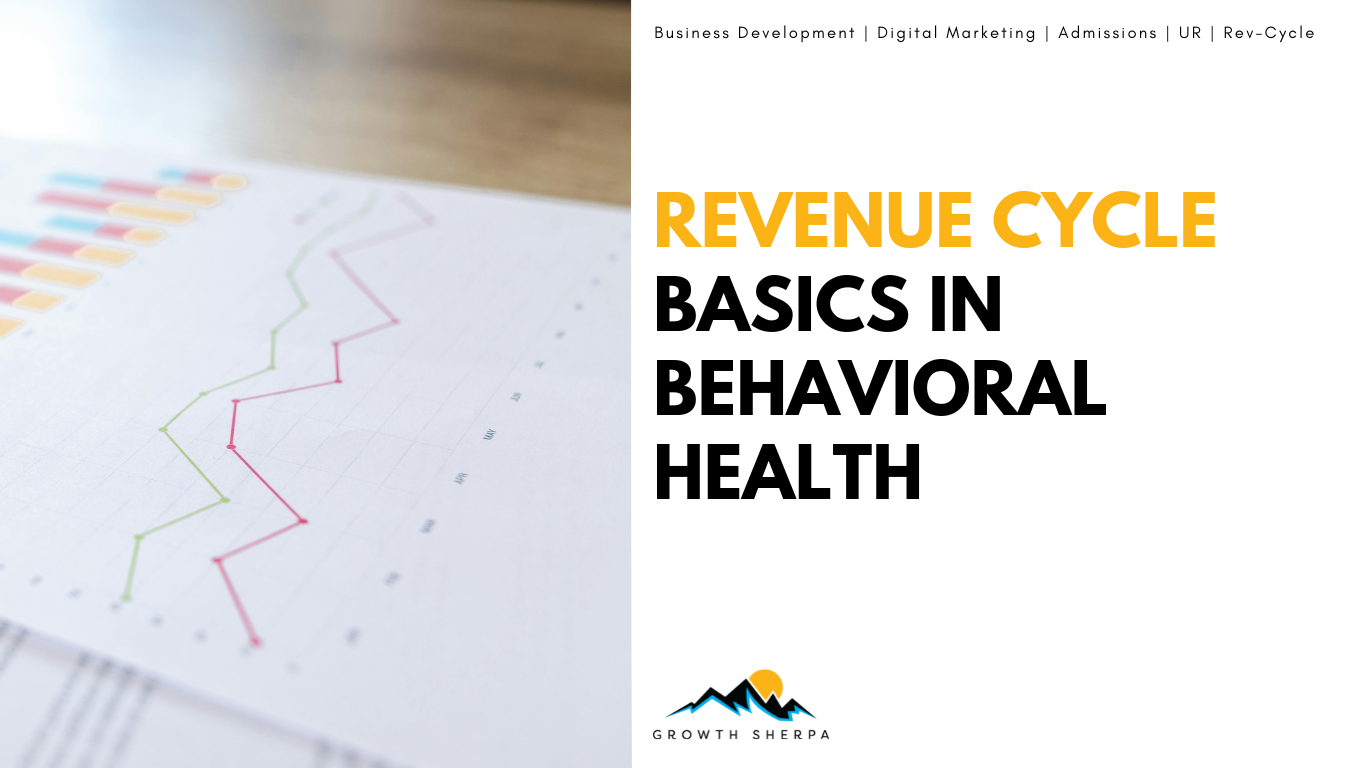In behavioral health and addiction treatment, managing the revenue cycle is crucial to ensuring the financial stability and operational success of your facility. Revenue cycle management (RCM) isn’t just about billing and collecting payments; it involves every step of the patient journey, from the initial inquiry to the final payment. For many facilities, an efficient revenue cycle can mean the difference between profitability and financial strain, especially as they navigate the complexities of insurance reimbursements, compliance, and patient collections.
This blog will break down the basics of the revenue cycle in behavioral health and addiction treatment, explain its key components, and offer some strategies to optimize your RCM processes for a healthier bottom line.
What is Revenue Cycle Management?
Revenue Cycle Management (RCM) refers to the process that facilities use to track the financial flow from the time a patient books an appointment until the final payment is collected for services rendered. RCM is designed to maximize cash flow and minimize financial disruptions by streamlining each part of the process. It involves multiple touchpoints, including patient registration, billing, claims submission, insurance verification, payment posting, and collections.
In the behavioral health and addiction treatment industries, the revenue cycle can be more complex due to specific challenges like patient payment responsibilities, insurance pre-authorizations, and the various levels of care offered, such as detox, residential, and outpatient programs.
The Key Components of the Revenue Cycle in Behavioral Health
Understanding the revenue cycle involves recognizing each key step in the process and ensuring that it’s managed efficiently.
1. Patient Access and Pre-Authorization
The first step in the revenue cycle begins with patient access, which includes scheduling, pre-registration, and verifying insurance benefits. For behavioral health and addiction treatment facilities, verifying insurance benefits is crucial because the cost of care can be high, and many patients are reliant on insurance coverage.
Best Practice: Verify insurance eligibility and obtain pre-authorizations before services are rendered to avoid delays or denials in payment. Patients should also be informed about any out-of-pocket costs upfront.
2. Registration and Documentation
Proper registration ensures that accurate patient data is collected and documented, including demographic information, insurance details, and any required consent forms. This information needs to be accurate from the start to prevent billing errors down the road.
Best Practice: Have clear protocols for capturing all necessary patient information during intake. Using electronic health records (EHR) systems to centralize this information can help streamline this process.
3. Coding and Charge Capture
Once services are provided, they must be accurately coded and documented to ensure correct billing. In the addiction treatment and behavioral health industries, accurate coding is essential to secure reimbursements from insurance companies. Services need to be assigned the appropriate CPT (Current Procedural Terminology) and ICD-10 (International Classification of Diseases) codes.
Best Practice: Invest in training for coding staff or work with certified medical coders who specialize in behavioral health to avoid costly mistakes or delays in payment.
4. Claims Submission and Management
The next step is submitting claims to insurance providers for reimbursement. Behavioral health claims can often be more challenging to process due to complexities with insurance companies, pre-authorizations, and specific treatment protocols.
Best Practice: Automate claims submission processes where possible and have systems in place to track and follow up on claims. Be proactive in resubmitting claims when necessary and resolving any disputes that may arise.
5. Payment Posting
After claims are processed by insurance, payments (or denials) are posted to the patient’s account. This is when you’ll find out if the claim was paid in full, partially paid, or denied. Facilities should have clear processes for reconciling payments and determining any balances owed by patients.
Best Practice: Use an RCM software solution that can integrate with your practice management system to track payment postings, denials, and any necessary adjustments in real-time.
6. Patient Collections
Once the insurance portion has been handled, the remaining balance becomes the responsibility of the patient. Collecting patient payments can be a challenge in behavioral health, as services can be expensive, and patients or their families may not always have the ability to pay out-of-pocket costs immediately.
Best Practice: Make it easy for patients to pay their bills by offering multiple payment options such as credit cards, payment plans, or online payment portals. Be transparent about costs upfront to avoid surprise bills, which can increase payment delays.
7. Denial Management
Claims can be denied for many reasons—errors in coding, missing documentation, or issues with pre-authorizations. Managing denials promptly and effectively is essential for maintaining cash flow. Failure to address denied claims can result in significant revenue loss over time.
Best Practice: Implement a structured denial management process. Train your staff to resolve issues quickly, appeal denials when appropriate, and correct errors to prevent future problems.
Common Challenges in Behavioral Health RCM
Revenue cycle management in behavioral health and addiction treatment comes with its own set of unique challenges. Some of the most common include:
- Insurance complexities: Behavioral health treatments, such as inpatient rehabilitation and therapy services, often require pre-authorization and are subject to frequent scrutiny from insurance companies. Navigating the maze of insurance requirements can lead to delayed payments and denials.
- High patient financial responsibility: Many behavioral health patients have high out-of-pocket costs, leading to an increased risk of unpaid bills or the need for payment plans. Collecting these payments can be time-consuming and resource-intensive.
- Regulatory compliance: Behavioral health facilities must adhere to strict regulatory guidelines, such as those set by HIPAA, to protect patient information and ensure the proper handling of claims.
Strategies to Improve Your Revenue Cycle
Optimizing your RCM processes can have a significant impact on your facility’s financial health. Here are some strategies to consider:
1. Invest in RCM Software
Automating key steps in the revenue cycle—such as claims submission, payment posting, and denial management—can reduce human error, speed up reimbursements, and improve overall efficiency. RCM software can also help track financial performance, giving you better insights into where your revenue cycle is succeeding or struggling.
2. Train Your Staff
An efficient revenue cycle depends on having well-trained staff who understand the nuances of behavioral health coding, billing, and collections. Regular training can help prevent errors, reduce claim denials, and improve patient satisfaction.
3. Partner with Experts
Many behavioral health and addiction treatment facilities benefit from partnering with revenue cycle management consultants or outsourcing certain RCM functions. Specialists in this area can help streamline processes, manage claims, and provide insights on improving your financial outcomes.
4. Improve Patient Communication
Transparency with patients about costs and financial responsibilities can reduce the risk of unpaid bills. Clearly communicate fees during the intake process and offer flexible payment options to make it easier for patients to pay.
Why RCM is Critical to Behavioral Health Success
Managing the revenue cycle is about more than just getting paid; it’s about creating a seamless experience for both your facility and your patients. With the right processes in place, behavioral health and addiction treatment facilities can optimize their RCM workflows, ensuring they get paid faster and more consistently while also reducing the stress on patients and staff.
At Growth Sherpa, we specialize in helping behavioral health facilities improve their revenue cycle management through a combination of expert consulting, automation tools, and proven strategies. Reach out to us today to learn how we can help you streamline your RCM processes and secure the financial future of your facility.

